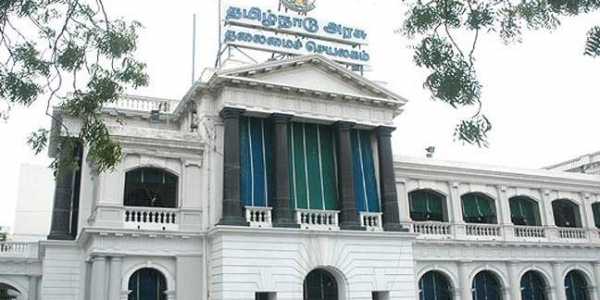
VC Bill: AIADMK’s stand ruptures age-old Dravidian unity on federal rights
Over the last 50 years, the DMK and AIADMK always buried their differences and spoke in one voice where state’s federal rights were concerned; the position seems to have changed now

Tamil Nadu’s Dravidian hegemony for about half a century has always had an unwritten pact between the DMK and AIADMK at its core. Among various points, the foremost in the pact is no-compromise on the federal rights of the state government.
But things seem to have changed in recent days. On Monday, April 25, while the ruling DMK led by Chief Minister MK Stalin passed a bill empowering the state to appoint Vice Chancellors in state-run universities, the AIADMK staged a walkout and was not present in the Assembly.
Critics say that following the demise of former Chief Minister J Jayalalithaa, the persistent leadership crisis in the AIADMK has made the party often toe the line of the BJP. Its stand on a range of issues – from NEET to language conflict to its inability to stand against the Union government’s beck and call – has earned the party the moniker ‘B team of BJP’. Now, with its stand on the issue of Governor appointing Vice-Chancellors (VCs), it seems the party has struck a final nail.
Also read: Black flag protest: Attempts to use TN Guv for politics wont fructify, asserts Stalin
“The fact is the AIADMK has never been serious about state rights or social justice from its inception,” VMS Subagunarajan, a Dravidian ideologue, told The Federal. “Its main objective is to oppose the DMK. However, Jayalalithaa had the electoral commitment to stand loyal to her people, if not for federalism. But the current leadership lacks even that trait and that is the problem.”
Taking a U-turn
On April 25, when the DMK government passed the bill that transfers powers from the Governor to the state government in appointing VCs for 13 state universities, the BJP and the AIADMK opposed it. While there is no surprise in BJP legislators opposing the bill, AIADMK legislators joining in raised eyebrows. In fact, in 1994, when the AIADMK was ruling the state, it brought in two similar bills, aiming to remove the powers of the Governor in making VC appointments. The Governor then was Chenna Reddy.
At that time, the DMK had a single representative in the Assembly due to its colossal loss in the 1991 elections. According to political observers, though there is no clarity on whether the DMK had welcomed the bill, there is no visible evidence to claim that it opposed it either.
Against this backdrop, the AIADMK’s opposition to the bill and walkout from the Assembly raise doubts about the commitment the party has to federal rights, said political observers.
Differences between the bills
“The AIADMK passed two bills on January 5, 1994,” said senior journalist and political commentator Tharasu Shyam. “One was to remove the Governor from the post of Chancellor and the other empowered the chief minister as Chancellor. But the DMK bill is completely different. It says while the Governor can continue as Chancellor, the power to appoint a VC is given to the chief minister,” he told The Federal.
As a syndicate member of Madurai Kamaraj University and a senate member of Annamalai University in 1994, Shyam was closely associated with the developments pertaining to the bills. He said that a case was also filed in the Madras High Court to cancel them. However, the court had refused to interfere in the issue.
“Then we had released a statement saying that if a state university does not have a Governor as a Chancellor, then as per the rules of the University Grants Commission, the university would not get any funding. Without funding, education activities get affected and the student community would suffer. Later, the bill was kept pending and, naturally, it lapsed over a period,” he said.
Instead of passing a bill, the DMK government should have passed a resolution, so that it could have projected our dissatisfaction at a national level, Shyam added. “Passing a bill is a wrong decision. It is not clear what kind of opposition the government is trying to express politically,” he said.
State rights or personal vendetta?
Talking to The Federal, Babu Murugavel, an advocate and official spokesperson of the AIADMK, said that by passing a bill against the Governor, the DMK has staged just another political drama.
Also read: Stalin keeps a nuanced distance while DMK slams Governor on all fronts
“The DMK tries to deviate the people’s attention from far more important problems…It repeatedly tries to harvest people’s anger and wants to project the Governor as anti-Tamil. It knows that the Governor would not give his assent to these kinds of bills. But still, the party tries to fool the people,” he said.
Murugavel added that the AIADMK has passed resolutions against NEET albeit knowing that they would not be given assent because the party wanted to respect the feelings of the people. “During our regime, we tried to (have good ties) with the Governor since he is the bridge between the Centre and the state. But the DMK wants the Governor to be its servant,” he said.
Political commentator Pongalur Manikandan said both the AIADMK and DMK had introduced these bills not in the state’s interest but to express their grudge against the Governor.
“Whether the VC is appointed by the Governor, like James Pitchai (former VC of Bharathiar University, Coimbatore), or making their supporters a VC, like in the case of RT Sabapathy Mohan (former VC of Manonmaniam Sundaranar University, Tirunelveli and a DMK leader), universities face corruption allegations and criticism. However, we should still go by the appointments made by the Governor so that the political clout in the university remains under control,” he told The Federal.

